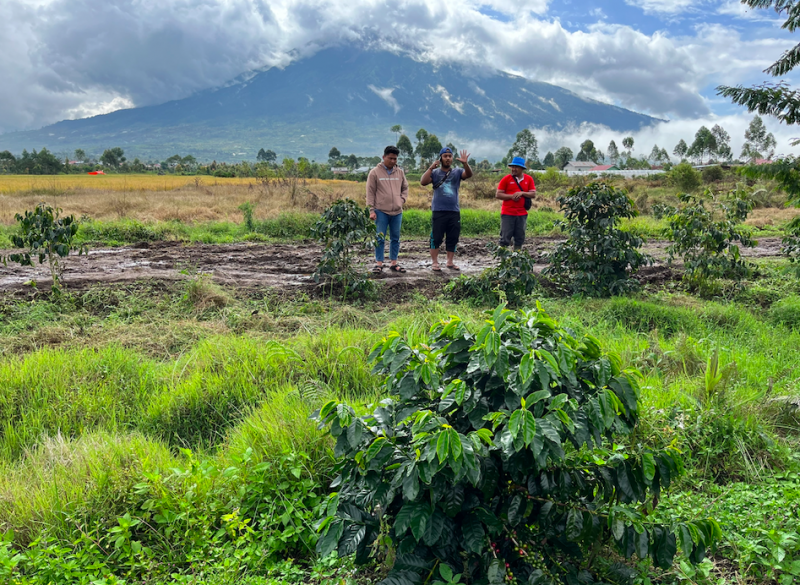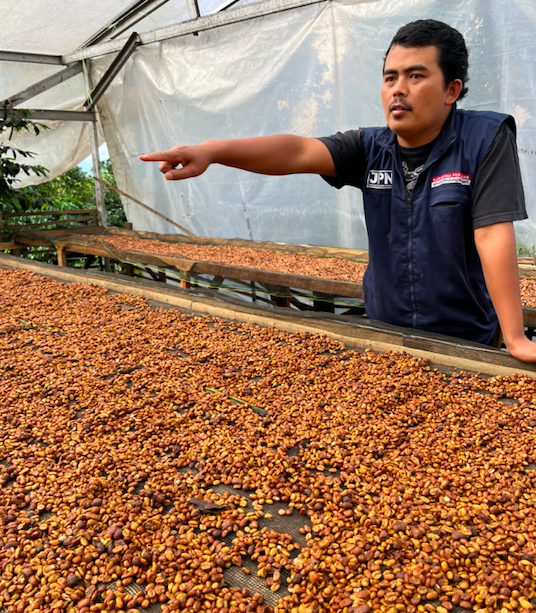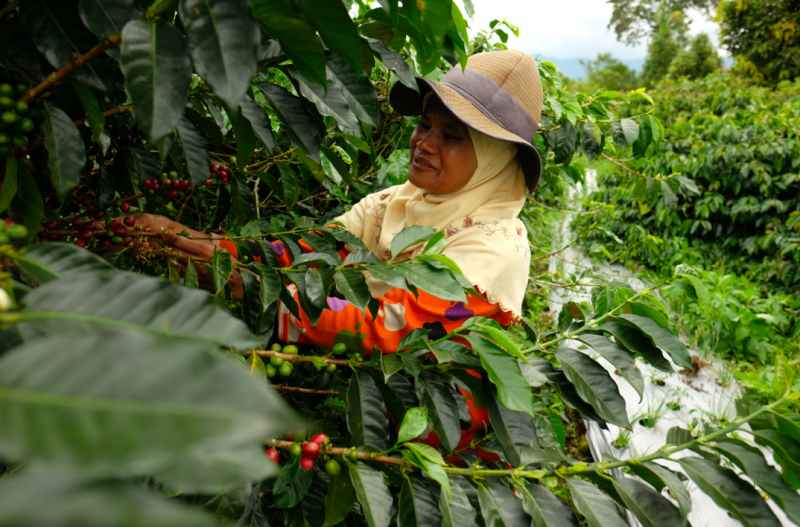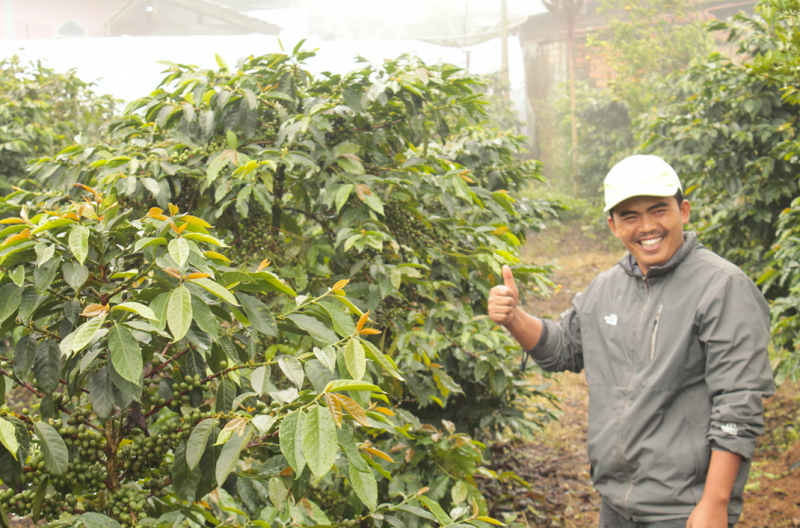The wild volcanic hills of Sumatra are home to rich soil perfect for growing incredibly delicious coffees.
Interviewer: Daniel Shewmaker
Interviewee: Triyono – Manager of Koperasi Kerinci Barokah Bersama (KKBB)

Home to no less than 68 volcanos, Sumatra inspires visions of idyllic, untouched beaches, wild and unridden waves and beautiful jungles. As it turns out the rich, volcanic earth means incredibly fertile coffee growing conditions. Daniel Shewmaker recently visited the Kerinci Barokah Bersama co-operative in the relatively new coffee growing region around Mount Kerinci to uncover what impact coffee growing has on the local community. It is important to us that consumers who drink coffee everyday have access to the producers. It is easy to complain about the price of coffee increasing and the specialty coffee industry as snobby or exclusive, but there are real humans behind the coffees. This particular co-operative is an example of thousands in Indonesian that is the 4th highest producing country in the world. The cooperative are trying to add to the country’s rich tradition by diversifying the coop's processing methods. This means funky, boozy anaerobic lots, Honey lots from Gunung Tujuh bringing forth a sweet and clean result, with lots of berry and citrus notes. We are privileged to hear their story. It brings us closer to the coffee and gives us a deep appreciation for all that goes in to every single cup.
Daniel Shewmaker: Can you tell us about the people behind KKBB?
Triyono: Early on, Rikolto assisted our farmers and the cooperative. Rikolto is an NGO dedicated to supporting smallholder farmers around the world. The local government, and the Bank of Indonesia also helped us. Last year in 2021 Bank Negara Indonesia, the commercial bank, also helped improve our coffee ecosystem by donating drying domes. This is from the side of stakeholders. Furthermore, at this time we have 13 processing stations and farmer groups who are our partners. Of these 13 partner units we have 390 farming families that are partners of KKBB. We produce from cherry to green coffee. Also, at this time in 2021, we are training and preparing individuals who will reinvigorate and replace leadership in the cooperative. I will stay involved in coffee but we will look for the younger generation to lead the cooperative and face the changes and new technology. This is what we hope for.

How does the sale of coffee impact the community?
Because we have been getting a good price from Sucafina, we can buy cherry at a higher price from the farmers so that their income increases. We also provide training in cultivation, harvesting and so on. Also, together with Sucafina and Rikolto, we at Kerinci Barokah have a program called PES (Payment for Ecosystem Services). This means our customers are participating in a program to protect the environment by planting shade trees through the contribution of avocado seedlings. We hope these seedlings are an added source of income for the farmers. So that they are not only generating income from coffee but also the shade trees.
What is the history of the land the cooperative operates on?
In Kerinci we know that the soil is fertile. Kerinci is the tallest active volcano in Indonesia and releases volcanic ash. We know that this sulphur is good for plants. The volcanic ash is regularly deposited in the soil and makes it fertile. It’s good for all types of plants including coffee. We are at the foot of Kerinci volcano in the highlands of central Sumatra.
How does the cooperative improve quality and yield?
Quality is certainly improved by working together with multiple parties. From the side of Rikolto, they assist with capacity building, cultivation and the like. Bank of Indonesia has contributed facilities so that our capacity and volume can increase. From the side of the buyer, Sucafina orders more coffee each year. At the beginning, they ordered a few tons of dry parchment and this year could be one hundred tons (of green coffee) to various countries and clients of Sucafina. Hopefully in 2023 we can continue to grow thanks to assistance from various parties. This is not because of one person, but the many who are involved.
What is the coffee drinking culture like in Sumatra?
Here, in fact, we drink coffee but before this, the land was mainly tea plantations (during the Dutch colonization). There was also coffee but we weren’t allowed to drink it. We were only allowed to drink the coffee leaves. They were dried above fire and the leaves were brewed like tea. This was called Kawu, or Kawu water. We weren’t allowed to drink coffee during the colonial era. Now, everyone can drink coffee. But some still drink kawu. Now, people drink coffee but mainly the commercial grades.
Have there been any environmental factors that have impacted coffee production?
Absolutely. We very much feel the impact of climate change at this time. This year the harvest is down significantly. Maybe 50% from last year. Because here in the mountains it has been raining every day. We know that coffee needs sunshine, because if it doesn’t get sunshine it won’t fruit and there will be disturbance to the fruit and delay. We also see more pests, fungus and the like. It’s a big impact on us and our farmers. Supply is scarce and demand is high. We know the cherry price is also very high now. Here at the cooperative, we don’t only think about coffee but also about service. We know the price has been continually increasing. We have contracts from before and this becomes a consideration. The impact of climate is very broad. Harvest is down, there are many pests and diseases. We hope in the future with an increased planting of shade trees will help mitigate the impact of climate change.
What are some of the major challenges faced in producing and selling coffee in this region?
Our production capacity is already close to produce 200 tons, but because harvest is down we aren’t filling it. At this time farmers are still very resistant to planting shade trees. This is a challenge for us. This is why we chose avocado instead of lamtoro as a shade tree, so that they will want to plant, thinking that this will be an additional source of income. But still farmers are resistant to planting shade, this is a challenge. Coffee is still relatively new in Kerinci, within the last 10-12 years. So, we need to face the challenge to improve cultivation.

What does a day in the life of a coffee farmer look like?
Farmers in the morning they go to their farm. It’s not just coffee that they grow, they also grow chilies, cabbage, potatoes. They take care of coffee and their vegetables. Vegetables are harvested every three months. But coffee they harvest every two weeks, even when there is a little bit they harvest every two weeks, all year round. Normally it would be 100 kilos (of cherry) now maybe it’s around 20 kilos. Coffee is used to meet their basic needs, they harvest the cherry and sell to the processing stations and use the money to buy rice, oil, and other basic necessities. The sale of vegetables is more utilized as savings or to pay for school fees. So, from morning until late afternoon they are working on their farms.
Other than farming are there additional sources of income?
There are a few, not everyone, that have livestock – cows and goats. We at the cooperative also hope to loan goats to farmers for three years after which the goats are transferred to other farmers. In three years, the goats can have three litters and these can be sold as an additional source of income. Goats and cows can become a source of savings for them.
For the consumers drinking coffee at home, what would you like them to know?
For consumers and customers, overseas and domestically, we would like them to know that coffee that is delicious and enjoyable comes from fertile farms. It’s not just about processing, we also have to preserve our farms, protect their fertility. We have implemented a program with Rikolto and Sucafina, PES, Payment for Ecosystem Services. We hope that all of our customers would like to donate for avocado seedlings, or something else in the future. This year still avocados but next year we can change to a new program. Maybe the donation of goats to our farmers, so that they can receive more benefits. We hope our customers can donate. Why goats? Because their manure can be used as fertilizer in the farm. Why shade trees (avocado)? To protect the fertility. When farms are fertile, the coffee is delicious. But when farms are not fertile, the coffee won’t taste great. Therefore, we hope all of our customers want to join in contributing to this program, so that we work together to protect Kerinci coffee.
